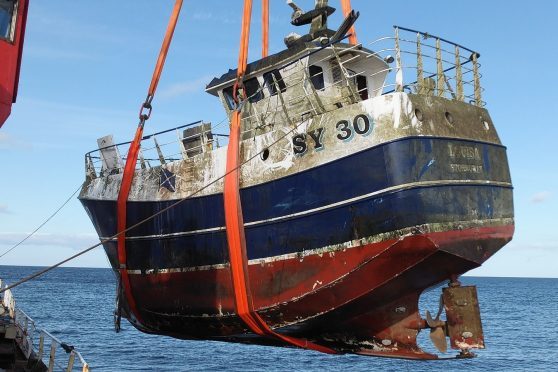The grieving family of a Western Isles fisherman lost at sea a year ago said they will never have closure until his body is found.
The Louisa went down off the small uninhabited Hebridean island of Mingulay, leaving Paul Alliston and his three crewmen in the cold sea, hanging onto the side of a barely floating liferaft that had failed to inflate.
It is considered as the worst fishing tragedy to hit the islands in half a century.
The bodies of Martin Johnstone and Chris Morrison were found in the days after the tragedy, and Lachlan Armstrong managed to swim to shore.
But remains of the 42-year-old skipper, also known as Paul McMillan, were never found, leaving his family with no official resting place for their loved one.
Yesterday, his relatoves attended a poignant memorial service in Stornoway almost exactly a year after the sad event.
Before the service, Mr Alliston’s brother Andy McMillan said the day “represents thanks for Paul’s life and to thank friends, family and everyone who helped us get through the last twelve months”.
He added: “We would have liked to have Paul home and have had a funeral for him 12 months ago.
“To a point time heals but it is not the same. Today gives us an element of closure but there still is not full closure because we don’t have Paul’s remains home.
“We can’t bury him – we don’t have anywhere to go on the anniversary of his death. The ocean was his grave, unfortunately.
“Just after the anniversary of the accident we feel now is the right time to thank everybody for everything they have done.”
He said it gave Mr Alliston’s friends a chance to say goodbye, adding: “Paul was very well loved on the island. It is really sad.”
The tragedy happened on April 9 last year.
Mr Johnstone, 29, from Caithness, and father-of-two Mr Morrison, 27, from Leverburgh, Harris, died.
Mr Armstrong from Stornoway, survived after managing to swim ashore to rocks.
During the last desperate minutes on the rapidly sinking crab boat, Mr Alliston went into the almost vertical, flooding wheelhouse to grab lifejackets for the four crew abandoning the vessel.
The boat’s liferaft did not inflate and the crew were submerged up to their necks in the chilly sea.
Locals say the body of Mr Alliston was later seen floating in the water, about half a mile away, close to shore.
Yesterday, Barra Lifeboat crew travelled from the southern tip of the Western Isles to join the large crowd of worshippers in Martin’s Memorial Church in Stornoway.
Mr McMillan expressed the family’s grateful thanks to the people of Barra and Uist “who all come together” to help.
At the end “there wasn’t much else that could have been done which hadn’t already been done,” he said.
Earlier, Rev Tommy Macneil said the service will not bring “ultimate closure to the family because they are still waiting and hoping for Paul’s remains to be found.
“The Western Isles is a close-knit community, and fishing is still at the very heart of who we are.”
The “whole community was gripped by a sense of mourning, sadness and loss,” after the tragedy, he said.
“I knew Paul personally as a teenager going about the town and I entered into a sense of grief myself for a mate who I had known and was a good pal of mine,” said Mr Macneil.
Mr Macneil gave a tribute to Paul and the “full of life character that he was.”
“While we mourn his loss we also want to come to God with thanksgiving for his life,” said Mr Macneil.
The Marine Accident Investigation Branch (MAIB) pledged to examine all details in an effort to establish the cause of the tragedy.
It salvaged the steel-hulled crabber off the seabed and took it ashore in Glasgow for tests.
MAIB officials were recently in the Western Isles to visit the families as part of a formal consultation ahead of the report’s publication, expected later this month.
